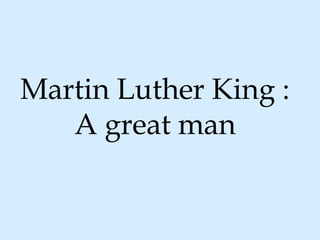
Martin luther king
- 1. Martin Luther King : A great man
- 2. King was an American clergyman, Nobel Peace Prize winner and one of the principal leaders of the United States civil rights movement. King was born on 15 January 1929 in Atlanta, Georgia. His father was a Baptist minister, his mother a schoolteacher. Originally named Michael, he was later renamed Martin. He entered Morehouse College in 1944 and then went to Crozer Religious Seminary to undertake postgraduate study, receiving his doctorate in 1955.
- 3. Returning to the South to become pastor of a Baptist Church in Montgomery, Alabama, King first achieved national renown when he helped mobilise the black boycott of the Montgomery bus system in 1955. This was organised after Rosa Parks, an African-American seamstress, left work and boarded a bus for home. As the bus became crowded, the bus driver ordered Parks to give up her seat to a white passenger. Montgomery's buses were segregated, with the seats in the front reserved for "whites only." Blacks had to sit at the back of the bus. But if the bus was crowded and all the "whites only" seats were filled, black people were expected to give up their seats—a black person sitting while a white person stood would never be tolerated in the racist South. Rosa had had enough of such humiliation, and refused to give up her seat. "I felt I had a right to stay where I was," she said. "I wanted this particular driver to know that we were being treated unfairly as individuals and as a people." The bus driver had her arrested.
- 4. Martin Luther King, Jr., heard about Parks's brave defiance and launched a 382-day boycott of Montgomery buses.. The 17,000 black residents of Montgomery pulled together and kept the boycott going for more than a year. Finally, the Supreme Court intervened and declared segregation on buses unconstitutional. Rosa Parks and the boycotters defeated the racist system, and she became known as "the mother of the civil rights movement." She wasn't the only leader of the civil rights movement, though. Martin Luther King was known by the way in which he led the movement.
- 5. King advocated civil disobedience, the non-violent resistance against unjust laws: "Non-violence is a powerful and just weapon which cuts without wounding and ennobles the man who wields it." Civil rights activists organized demonstrations, marches, boycotts, strikes, and voter-registration drives, and refused to obey laws that they knew were wrong and unjust. These peaceful forms of protest were often met with vicious threats, arrests, beatings, and worse. King emphasized how important it was that the civil rights movement did not sink to the level of the racists and hate mongers they fought against: "Let us not seek to satisfy our thirst for freedom by drinking from the cup of bitterness and hatred," he urged. "We must forever conduct our struggle on the high plane of dignity and discipline ». King's philosophy of "tough- mindedness and tenderheartedness" was not only highly effective, but it gave the civil rights movement an inspiring moral authority and grace.
- 6. In 1963, King led mass protests against discriminatory practices in Birmingham, Alabama where the white population were violently resisting desegregation. The city was dubbed 'Bombingham' as attacks against civil rights protesters increased, and King was arrested and jailed for his part in the protests. After his release, King participated in the enormous civil rights march on Washington in August 1963, and delivered his famous 'I have a dream' speech, predicting a day when the promise of freedom and equality for all would become a reality in America. In 1964, he was awarded the Nobel Peace Prize. In 1965, he led a campaign to register blacks to vote. The same year the US Congress passed the Voting Rights Act outlawing the discriminatory practices that had barred blacks from voting in the south.
- 7. Over 250.000 persons gather in washington in August, 1963 urging support for pending civil rights legislation.
- 8. Conclusion : Martin Luther King Jr. was a great man who stood up for what he believed in. He brought together to nations and helped us see things in someone else's eyes. He is such a great guy and will always be remembered in our lives. He took a stand against powerful people when no one else would. He kept trying once he was doubted and threatened. Martin Luther King Jr. got people around the world to look past "black" labeling and accept and love him.
- 9. He was one of the greatest liberals that ever walked this earth. Dr. King is one of the few true American heroes. In an age where it has become fashionable to hero-bash--uncovering the nefarious backgrounds and destroying the myths of American heroes, like George Washington and John F. Kennedy--the name of Dr. King has remains unblemished, and justifiably so Dr. King stood for what he believed, and was a man ahead of his time. In the face of adversity, he dedicated and sacrificed his life for the equality of all people. His dream, which many today still share, has continued to live on as his legacy. His adversaries took his life, but his heroic legacy will never die. "Free at last, free at last, thank God almighty we're free at last." Because he was brave enough to preach his thoughts without fear. Some day I want to have enough courage and love to be able to do that.
